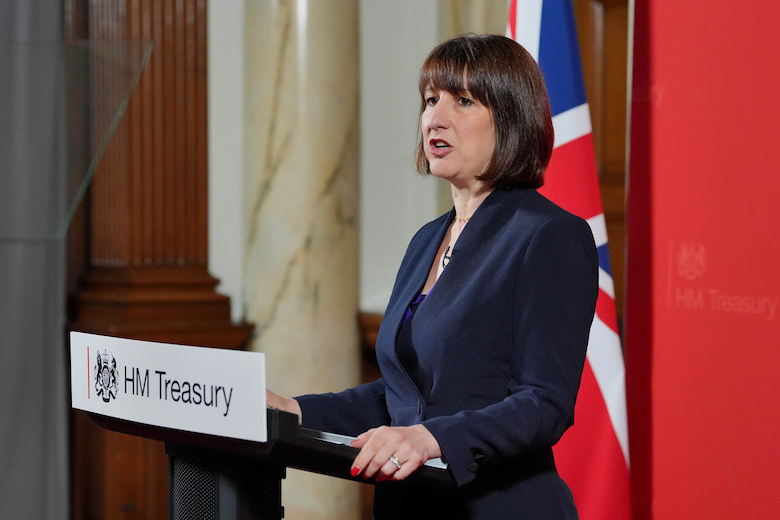As the dust around the election settles, a question Tory MPs and supporters still grapple with is why Rishi Sunak called the election when he did – not least because economic indicators point to improvements over the summer and autumn, as inflation returns to target and growth starts to pick up. But Rachel Reeves, the new Chancellor, is having none of this narrative. ‘I really don’t buy this idea that somehow we’ve been handed a golden inheritance,’ she told Laura Kuenssberg on the BBC this morning, in her first sit-down interview since she entered No. 11. ‘If the former prime minister and chancellor had thought things were so good, they would have allowed the election to take place in the autumn. They called an election because they weren’t willing to make tough decisions, and they just ran away.’
It’s a point former chancellor Jeremy Hunt disputed when he sat down with Kuenssberg afterwards: Reeves ‘wants to lay the ground for tax rises’ he said. Will tax hikes be the kind of ‘tough decisions’ she says are coming?
They could well be, though this morning’s interview with the Chancellor focused more on the spending side of the ledger – and the things she won’t give way on without finding the cash first. While Reeves would not commit this morning on the independent recommendations for a pay rise of 5.5 per cent for NHS staff and teachers, her language suggested that being able to approve light a public sector pay boost was a priority. Not only did she take the pay bodies’ recommendations seriously, she stressed the cost of not granting the pay rises – which would probably include another round of strikes, at a time when negotiations over pay for junior doctors are still outstanding.
“There is a cost to not settling [public sector pay disputes]”
— BBC Politics (@BBCPolitics) July 21, 2024
Chancellor Rachel Reeves has hinted that she may give public sector workers above-inflation pay rises this summer and says the government will “make sure the sums add up”#BBCLauraK https://t.co/YAP4umHeFS pic.twitter.com/MoMHusBJev
If pay hikes for teachers and health staff are the priority, it will mean finding around £3.5 billion to cover the costs, according to the Institute for Fiscal Studies. That might be possible: with recent growth figures slightly better than expected, and a relatively loose fiscal rule for getting debt falling as a percentage of GDP (one that allowed the Tories to suggest tough decisions were coming at the end of every five-year rolling forecast), Reeves can probably scrape together the money. But it will be hard to do this and also to lift the two-child benefit cap – a growing source of tension within the Labour party, despite the government insisting during the campaign that it would not be immediately scrapped.
Labour will want whatever it does next to be framed as necessary to fix the financial mess the previous government left behind
Reeves suggested that we’ll know more at the end of the month, when the date for the Autumn Statement is revealed and when she gives a ‘full analysis of the state of the public finances, of the public spending pressures that we’re under’ to parliament. As Kuenssberg pointed out during the interview, most of that information is already in the public domain. Reeves pivoted to prisons as an example of how she doesn’t think ‘anyone realised quite how bad things were’. This is the next battle, at least on narrative, to come: Labour will want whatever it does next (including possible tax rises, and certainly rejections of extra spending) to be framed as necessary to fix the financial mess the previous government left behind.
The opposition will highlight that the state of the finances is largely a result of Covid policy (which was backed by both parties) – and that any tax hikes are Labour’s to own. (‘Every Labour government in history has done that,’ Hunt said this morning about the likelihood of tax hikes, ‘but [Reeves] should have been honest about that before the election.’)
But for now, Labour has the advantage: the Tory party has no real leader and no immediate plans to get one, while Labour is using its first weeks in power to make smart moves on supply-side reforms. ‘We’ve got to break out of this doom loop of low growth, of high taxes and deteriorating public services,’ Reeves said this morning. She added: ‘We’ve got to grow the economy,’ pointing to the beginnings of a planning overhaul announced in the King’s Speech last week.
It may be early days, but the party is showing signs that it will stick to its game plan to get Britain building. When pressed this morning on local pushback for new energy infrastructure, Reeves didn’t budge. ‘We can’t carry on like we are. We can’t carry on not building energy infrastructure and not building housing. Because if we carry on like we are, energy bills are going to go through the roof.’ It’s the kind of stance that wins Labour a lot of credit with groups that aren’t traditionally in the party’s camp: including Hunt, now the shadow chancellor, who used his first comments on the programme this morning to give his support to her planning agenda.
That goodwill is likely to last for a few more months. But it’s after the Autumn Statement that we will see the real dividing lines emerge.







Comments